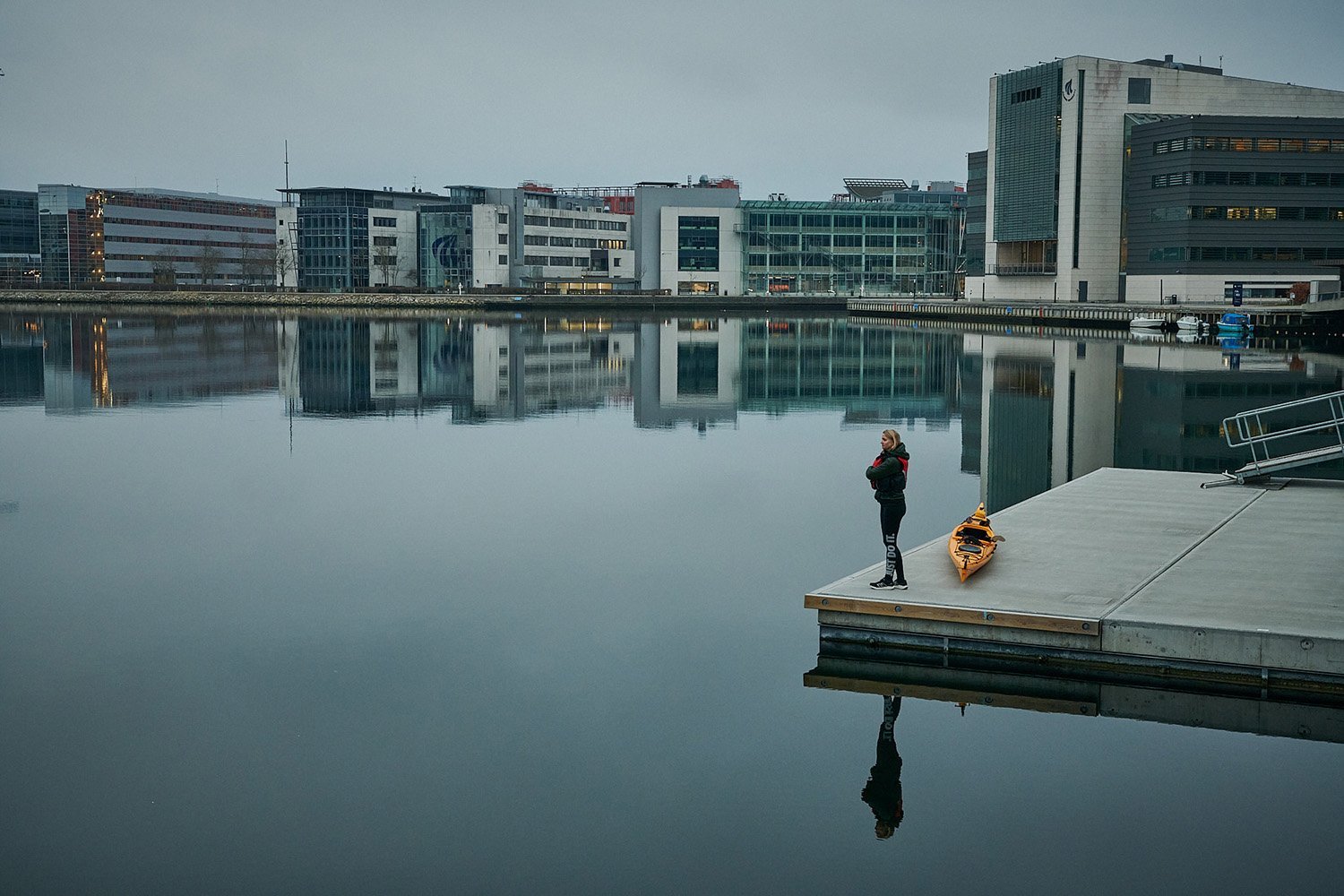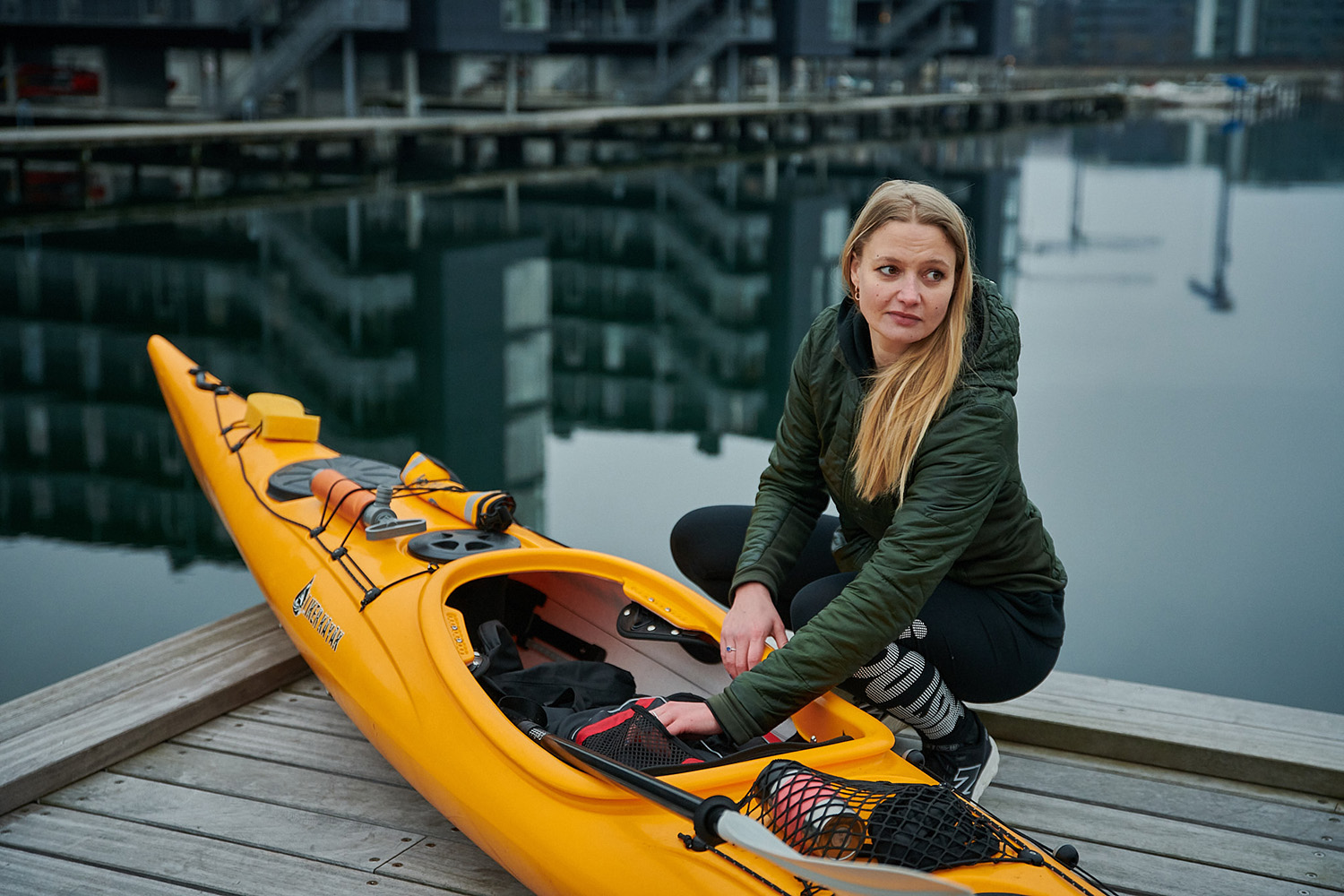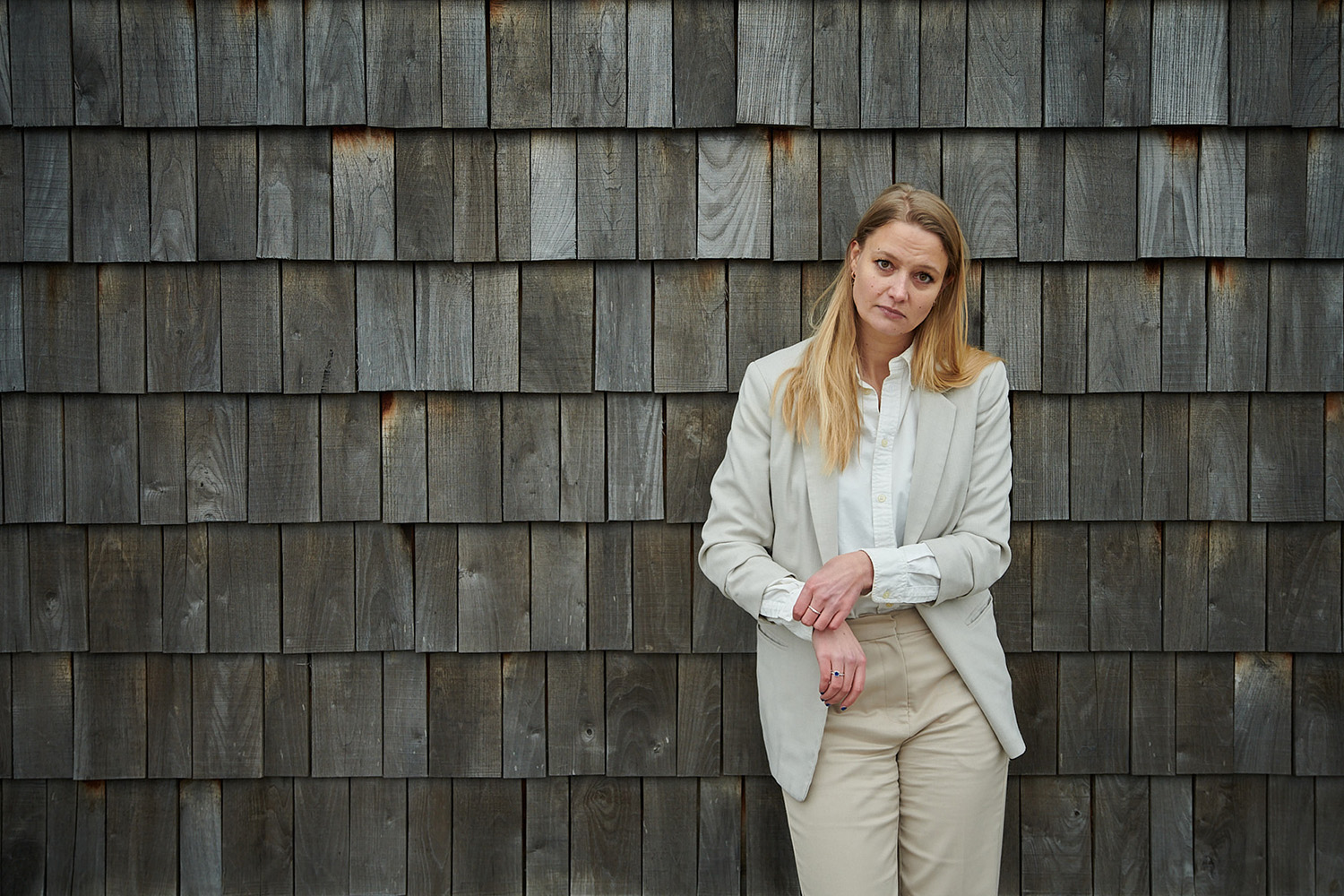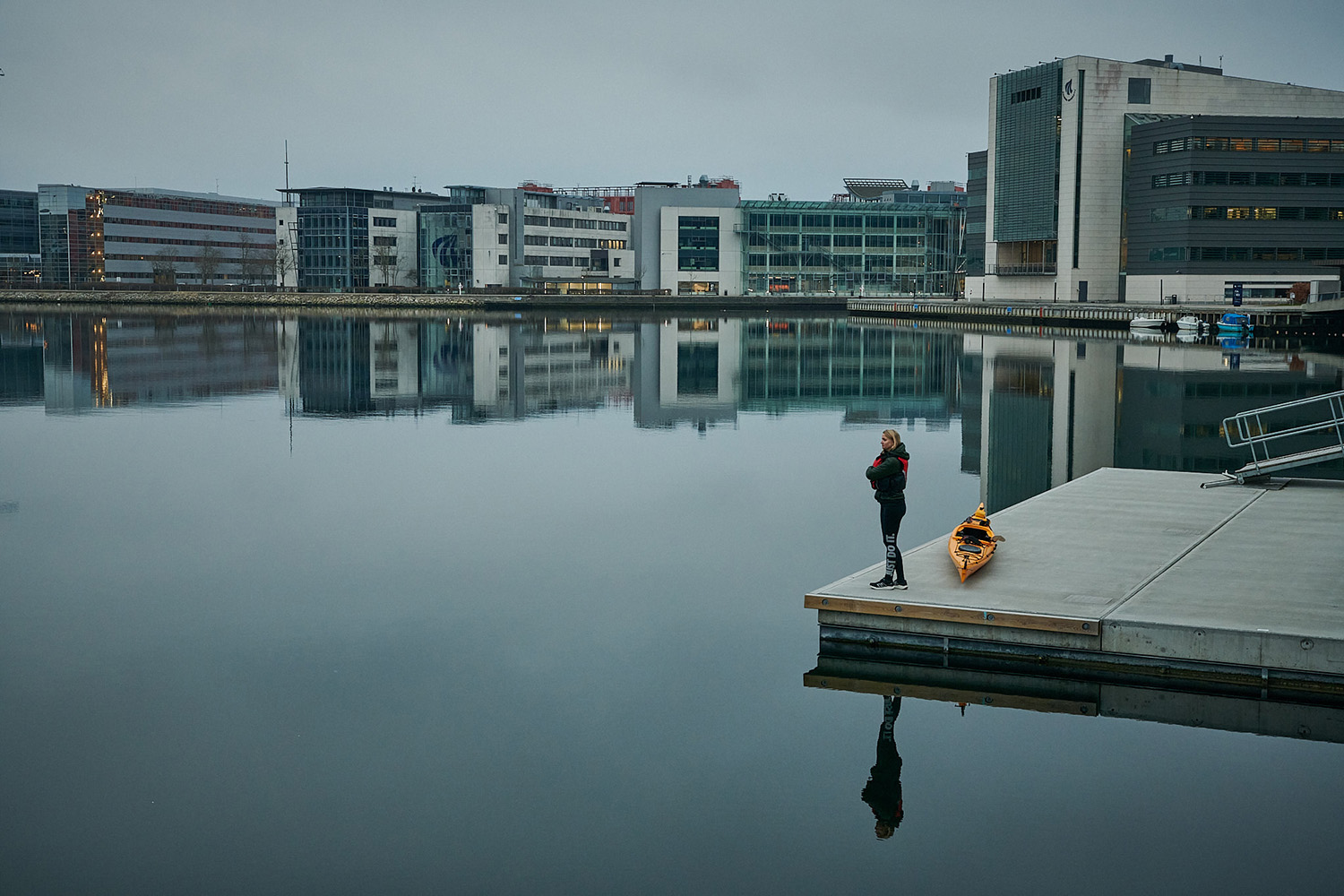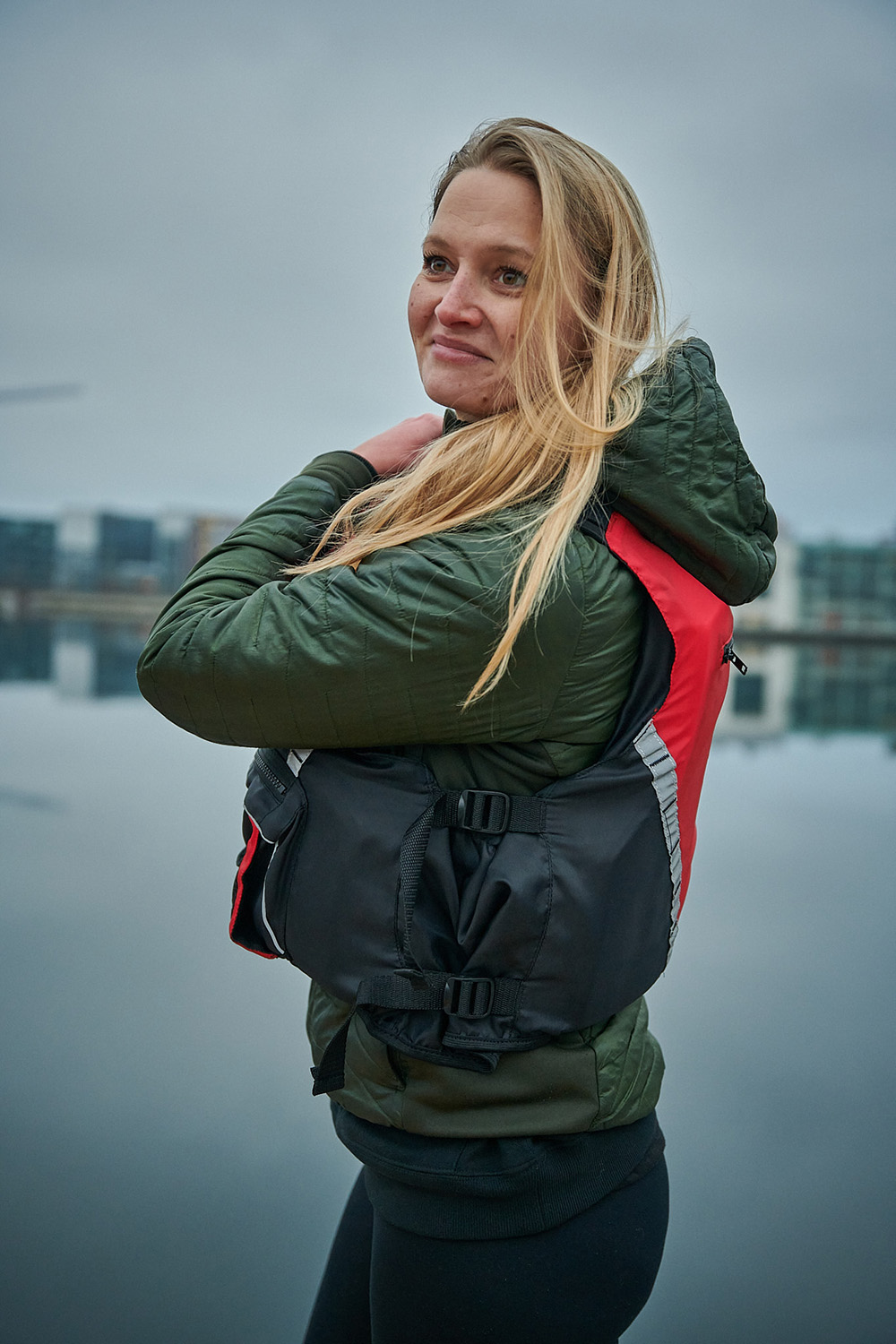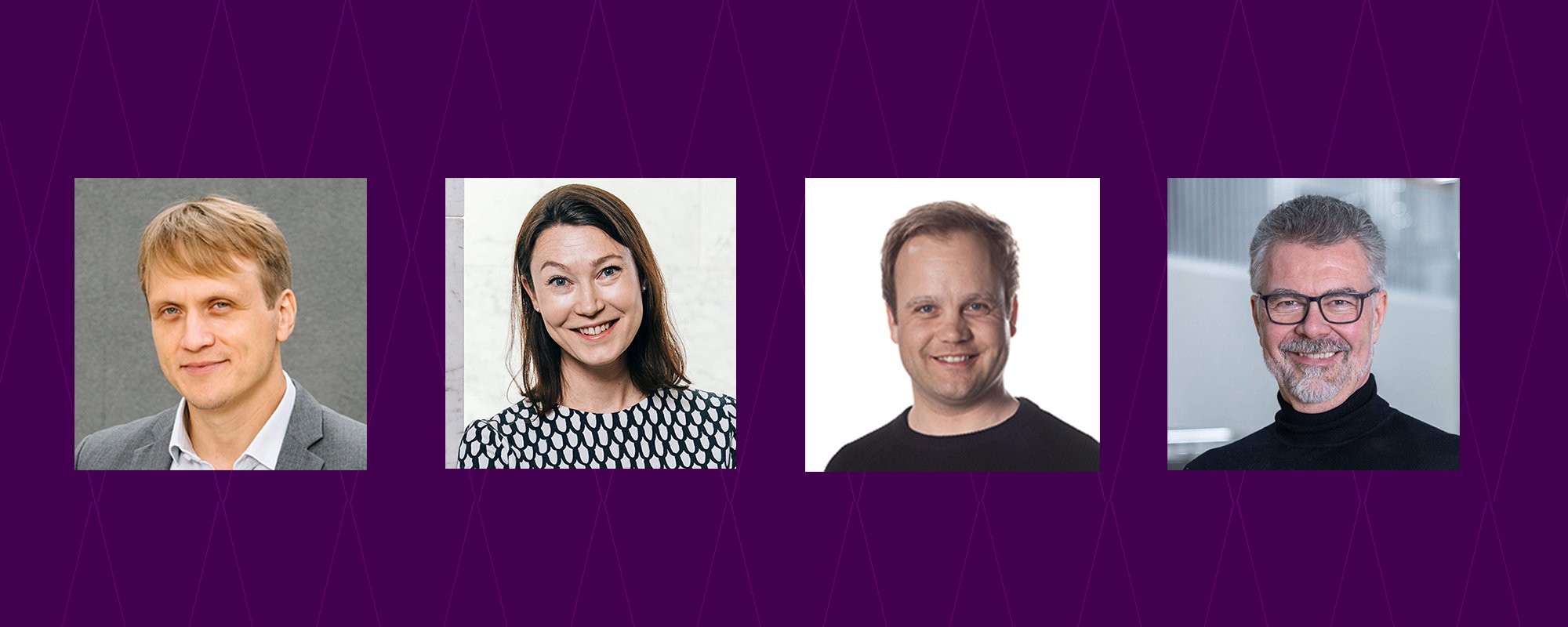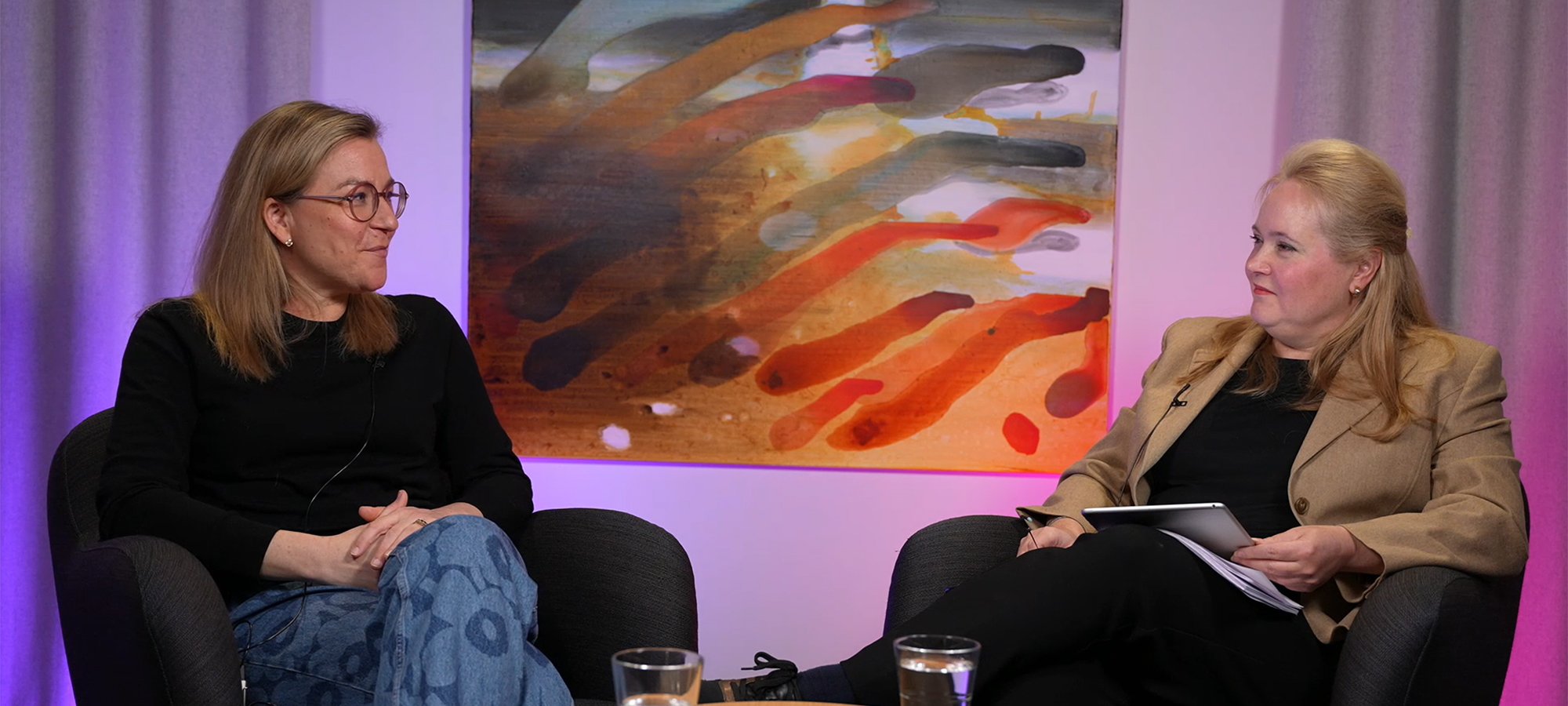As she launches her kayak from the Teglholm jetty, sustainability adviser Louise Kofod Thomsen sees her hometown of Copenhagen from a different perspective.
"On land, you don't realize how much water there is in Copenhagen. You can get anywhere along the canals."
Copenhagen became a city of canals in the 17th century when builder-king Christian IV fell under the charm of the waterways of Holland’s cities. Today, the waters of Teglholmen and the surrounding Sydhavn area are alive with the water activities of the 2020s: In addition to kayaks, swimmers splash about, and boats and water buses chug up and down the canals between the apartment blocks and in the harbor basin.
Kayaking became a cherished hobby for Kofod Thomsen during the pandemic. Fresh air was often essential, as was a fresh perspective.
Many companies would like to be able to deal with sustainability by ticking items off their to do list. But that’s not enough.
Changing perspectives is also part of Kofod Thomsen's work, as she helps companies figure out how to get started with sustainability issues and how their sustainability practices can be as efficient as possible.
Kofod Thomsen’s company is called LT Cambio, and specializes in sustainability and green transition for Nordic SMEs. She advises companies on sustainability strategies and practical sustainability measures. She lectures on sustainability for AaltoEE and the Copenhagen Business School.
In ten years, the role of sustainability (ESG) in business has been revolutionized. An increasing number of companies want sustainability and the green transition to be at the heart of their business, be their motivation to keep the planet habitable, increased regulation, risk management, or the pursuit of competitive advantage.
|
|
| Kayaking became a cherished hobby for Kofod Thomsen during the pandemic. Fresh air was often essential, as was a fresh perspective. |
Many companies would like to be able to deal with sustainability by ticking items off their to do list. But that’s not enough.
“Companies need to learn new things and gain new knowledge continuously.”
"Now, sustainability is a core business activity, verifiable through measurements and determined by regulations."
As society changes, companies need to change with it. The forces driving change come from many directions:
Sustainability regulation is increasing and becoming more comprehensive, and we are learning more about how business activities impact the advancement of climate change and the loss of biodiversity.
Employees’ and stakeholders’ demands and perceptions of sustainability also keep changing. Sustainability can be compared to product development – that’s also never-ending.
Kofod Thomsen's work is very concrete.
“Ten years ago, sustainability was all about communication, about telling companies’ sustainability stories. Now it's a core business activity, verifiable through measurements and determined by regulations,” Kofod Thomsen sums up.
Sustainability work is based on gathering, documenting and analyzing data. The data that is gathered is practical. What does the data tell us about the energy and the raw materials that we use? What can we learn from a survey of employees’ salaries based on gender and work tasks? How much will emissions decrease if we stop serving red meat in canteens?
According to Kofod Thomsen, companies don’t always understand the extent of their impact on the society around them.
When a company handles sustainability issues competently, it makes money and creates jobs
Kofod Thomsen specializes in Nordic SMEs, the range of which is wide: In Denmark, companies that have between 2 and 249 employees are classed as SMEs.
The sustainability measures, or the lack of them, in large companies are publicly visible, for better or for worse. A classic horrific example is an oil company spill scandal. On the other hand, positive publicity is guaranteed to companies that provide training, health care or children’s day-care for their employees.
A great deal of academic research has focused on sustainability measures in large companies.
But it’s a different story for SMEs. They can’t directly apply the measures of big companies to their own activities, as they don’t have such abundant resources.
According to Kofod Thomsen, research data on SMEs’ sustainability measures and sustainability practices are surprisingly scarce, despite the high in number of these companies.
In Denmark, for example, 99% of companies are SMEs, their turnover is half of Danish companies’ overall turnover, and 46% of full-time employees work in SMEs.
|
|
| Kofod Thomsen says that SMEs are more cautious because they are afraid of falling victim to greenwashing scandals. |
“SMEs don’t necessarily have employees who are specialized in sustainability. They also differ from larger companies in that they communicate less, both internally and externally about the initiatives related to sustainability that they are already doing.”
SMEs do not always understand why sustainability measures are necessary. Employees may be worried about the financial consequences of sustainability practices for their wages or their jobs, for example. They may feel that the new practices will bring change to the workplace. Therefore, motivating employees is an essential part of a successful sustainability process.
Kofod Thomsen rejects the view that sustainability is automatically expensive for companies.
“The idea that sustainability costs money is outdated. When a company handles sustainability issues competently, it makes money and creates jobs.”
Kofod Thomsen bases her argument on the fact that sustainability analyses usually make companies use energy and raw materials more efficiently and optimize their processes. This in turn reduces costs and often increases a positive brand image. When sustainable behavior attracts more customers, sales increase.
Today, large companies make a lot of noise about their sustainability-promoting activities.
Kofod Thomsen says that SMEs are more cautious because they are afraid of falling victim to greenwashing scandals. They may not even realize that their sustainability measures are worth shouting about.
“We’ve always done it like this, they say when I ask them.”
"The trick is to just start, anywhere"
The pace of reform is now so rapid that companies are having to promote sustainability more quickly than they might be able to.
“This is a challenge for me in my work, too. Companies need to make a very quick mindset change.”
Sustainability requirements can seem enormous and daunting. So, it’s a good idea to approach the sustainability process pragmatically.
“The trick is to just start, anywhere, and not to take on too much at once.”
The very key to a successful process is setting a realistic level of ambition. It's easy for companies to claim that they want to be leaders in sustainability, but according to Kofod Thomsen, few companies really want to be.
At the forefront, they are the ones that test new methods and have to bear the reactions they provoke. The financial costs of being a pioneer can also be high, although it may also bring financial gains. Often companies want to set ambitions that align with their competitors.
"Once its emissions are calculated and it is able to send the calculation to its customers, the SME becomes these customers’ favorite by providing data on the emissions."
When helping companies analyze the sustainability of their operations, Kofod Thomsen guides them to start by calculating their key ESG (Environmental, Social, Governance) figures.
This means identifying the company’s most relevant sustainability elements. A question that most sustainability processes start with today is: what sustainability issues are material to our company and the industry we are operating in?
Usually, a company chooses to start with climate impacts.
|
|
| Even if the SME itself is not yet obliged to conduct a rigorous emissions analysis, the customer may be. SMEs’ customers are often larger companies, and their obligations are already legislatively fairly comprehensive, says Kofod Thomsen. |
“SMEs often need external help to do this. But once its emissions are calculated and it is able to send the calculation to its customers, the SME becomes these customers’ favorite by providing data on the emissions,” Kofod Thomsen says encouragingly.
Even if the SME itself is not yet obliged to conduct a rigorous emissions analysis, the customer may be. SMEs’ customers are often larger companies, and their obligations are already legislatively fairly comprehensive.
Kofod Thomsen offers an example of a small Danish company that produces non-alcoholic drinks. The company's customers are Danish retail giants, so their work is made easier when their subcontractor has calculated the figures, even if it isn’t yet required by the law to do so.
So, the tighter regulation of big companies has a trickle-down effect.
Another example is a company that does electrical work in properties under renovation. Its customers are usually landlords and large construction companies.
“An electrical contractor doesn't necessarily need to analyze its sustainability practices in detail, but its customers do. This gives the electrical contractor a direction for its own sustainability measures.”
It is also a competitive advantage for an electrical contractor to be able to accurately report on its sustainability practices, even though regulation does not yet require this.
Companies need to reflect their customers
The elements of sustainability are ESG: Environmental, (which is the most familiar of the sustainability elements to many people), Social, and Governance.
According to Kofod Thomsen, diversity, which comes under social sustainability, has become a “huge theme”.
“Companies need to reflect their customers and society they are a part of.”
One way in which they can do this is by ensuring that their workforce is as diverse as possible.
"In Denmark it's too easy to say you're a leader."
Most commonly, companies look at diversity through the gender distribution of their workforce.
As an example, Kofod Thomsen cites the fact that in Denmark, women are significantly less likely to be in top management positions than men.
In December 2023, according to a survey by the Confederation of Danish Industry (DI), 50.9% of Danish companies only had men on their boards. Women make up 17.5% of all board members.
According to Kofod Thomsen, this will not be remedied until everyone admits that there is a problem. She calls for a thorough analysis of recruitment processes.
The Nordic countries have been labeled global pioneers in sustainability issues. But this can fool them into thinking their activities are more valid than they really are.
“In Denmark, it’s too easy to say you are a 'leader'. We lean on it like a cushion.”
Of course, diversity isn’t just about gender. It is also tightly linked to the company's values. It can therefore be an issue in recruitment.
Sustainability makes your company more attractive
All the factors of ESG are intertwined and matter in recruitment. It would be challenging to single out a one, particular factor from the point of view of the future employees.
“If companies do not work on sustainability, they may find it difficult to attract and retain young employees.”
The younger the employee, the more likely they are to give weight to the companies’ sustainability policy when considering a job. And with many sectors facing long-term labor shortages, employees' views are increasingly important.
A company risks failing to get its industry’s top experts on board if its environmental actions and its personnel policy are not sustainability oriented.
Survey after survey has proven that an overwhelming proportion of Millennials and younger people want a company's values to match their own.
|
|
| Survey after survey has proven that an overwhelming proportion of Millennials and younger people want a company's values to match their own. |
“This is really bubbling up in workplaces.”
Kofod Thomsen is herself a good example of a Millennial in working life. She is almost the prototype for the Copenhagen Millennial: a cycling sustainability consultant. She chooses oat milk for her tea in the café.
Kofod Thomsen lives in Frederiksberg, in the center of Copenhagen. She describes herself as an outdoor type. She and her partner Pelle Pedersen have a summer cottage on the island of Orø on the west coast of Zealand. They are trying out natural farming in their garden there and nurturing a wild garden to create living places for more bees, butterflies, insects and plants.
"Young generations want authenticity and genuiness, and not the working life of a big company."
Typical of educated Danish Millennials, Kofod Thomsen runs her own company, LT Cambio. She says she would not be a good fit as the employee of a big consulting firm because she has “her independent thinking could be better utilized outside the traditional consulting company”.
Countless surveys have found that Millennials and Zoomers want employers’ values to match their own. Kofod Thomsen has seen this in practice when teaching students 15 years younger than her in the Copenhagen Business School. They are clearly even more aware of their own boundaries and well-being than those in their thirties.
“They want authenticity and genuineness, and not the working life of a big company. If companies don't understand this, they won't get them as employees”.
Millennials and Zoomers do not want work to dominate all aspects of their lives. They want to leave time and energy for hobbies like kayaking.
For Kofod Thomsen, the abundance of life on the waterfront is good entertainment. Occasionally, she parks her kayak beside a café boat for a glass of wine.
“It's surprising how many new places you find. We have a seal here too. We call it Sluzy”.
















